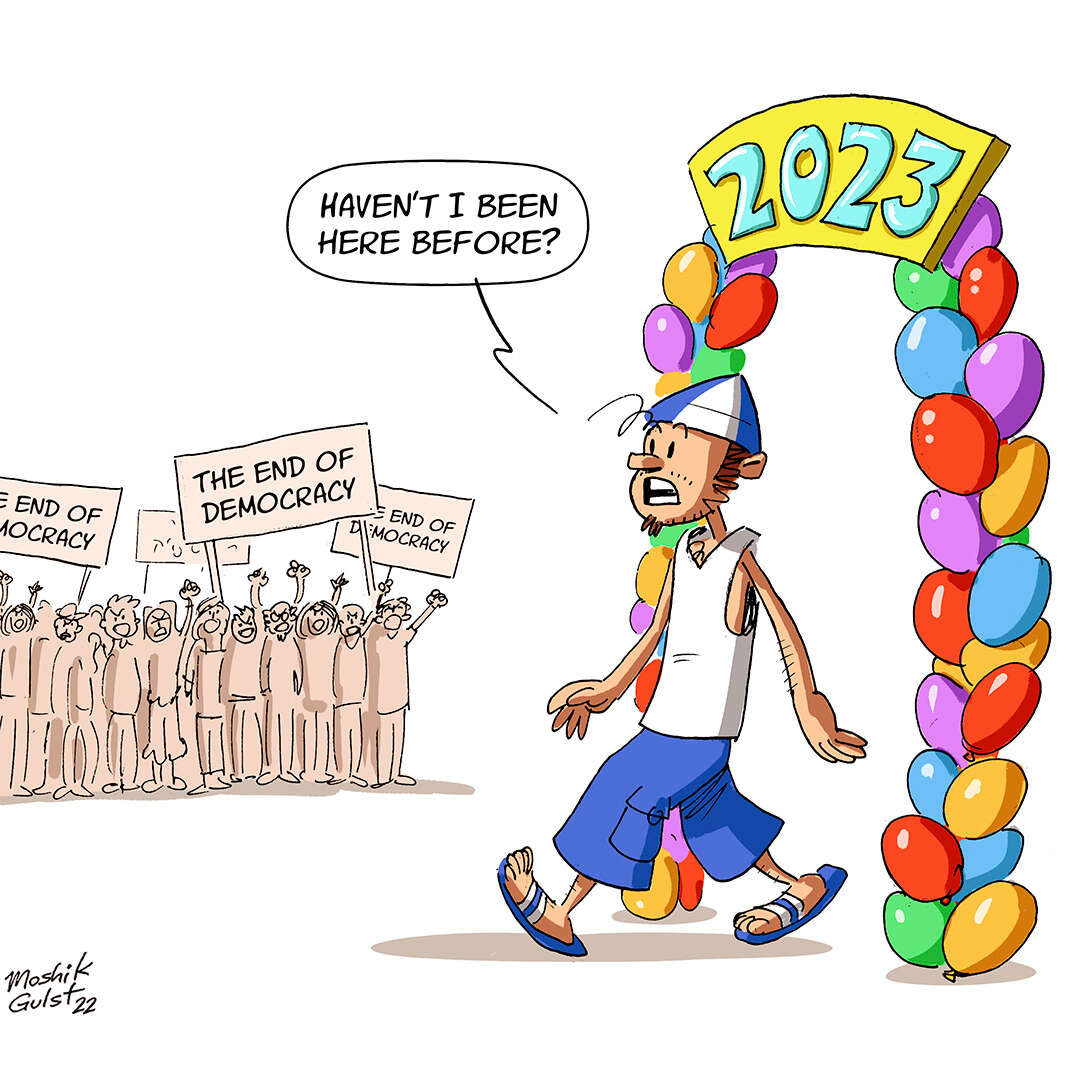
I watched, open-mouthed as Zelenskyy became argumentative,
even hostile to the vice president and president in front of the press. It was so
shocking I didn’t even have words for what I was seeing. “Oh my God,” I said
over and over again like a mantra. “What an idiot! Why???”
I put the knife down, afraid I’d nick myself. I’d been checking two kilograms of dried apricots for bugs so I could make hamantaschen filling. My phone blared Zelenskyy, its tiny screen propped against a vase of Shabbos flowers in front of which I sat with my cutting board and a mound of wrinkly, plump and fragrant fruit. And a knife.
But the apricots could
wait. This needed my full attention.
There was so much going on that I didn’t know where to look.
Trump’s face got so red I thought he would plotz. I sincerely hope he wouldn’t
croak. But if two assassination attempts didn’t take him down, neither would some
weaselly little guy with a Napoleon complex in fake fatigues.
Zelenskyy had really stepped in it this time—it was one for
the history books. If you ever meet someone who doesn’t understand the term
“own goal,” just tell them about the time Zelenskyy, who should have been
humbly begging Trump to save his country, self-eviscerated in the Oval Office
in front of the press—and everyone else. In the world.
But this wasn’t the first time an ungrateful Zelenskyy decided
to FAFO
what an American president would do when treated with disdainful impertinence. He did it to Biden, too:
It’s become routine since Russia invaded Ukraine: President Joe Biden and Ukrainian President Volodymyr Zelenskyy speak by phone whenever the U.S. announces a new package of military assistance for Kyiv.
But a phone call between the two leaders in June played out differently from previous ones, according to four people familiar with the call. Biden had barely finished telling Zelenskyy he’d just greenlighted another $1 billion in U.S. military assistance for Ukraine when Zelenskyy started listing all the additional help he needed and wasn’t getting. Biden lost his temper, the people familiar with the call said. The American people were being quite generous, and his administration and the U.S. military were working hard to help Ukraine, he said, raising his voice, and Zelenskyy could show a little more gratitude.
These were not isolated incidents. This is what Zelenskyy
does. He did it to Trump and JD Vance. He did it to Biden. And he did it to
Israel, too.
Back in 2022, I noted that in his address to the Knesset, Zelenskyy rubbed Israelis the wrong way when he claimed that Ukrainians saved Jews during WWII:
Zelenskyy has left us Israelis with a bad taste in our mouths. He’s a hero the world over, and we want to like him, too. But it’s difficult for Israelis to like him after the things he said in his address to the Israeli Knesset on Sunday. President Zelenskyy hit all the wrong notes, pointing an accusatory finger at Israel with one criticism after another.
Zelenskyy criticized Israel for not doing enough to help Ukraine, for not supplying the right kind of aid, for not applying pressure to Russian businesses. The Ukrainian president asserted that Ukrainians saved Jews during the Holocaust, while Jews have turned their backs on the Ukrainian people.
“One can keep asking why we can't get weapons from you. Or why Israel has not imposed strong sanctions against Russia. Why it doesn’t put pressure on Russian business. But it is up to you, dear brothers and sisters, to choose the answer. And you will have to live with this answer, people of Israel.
“Ukrainians have made their choice. Eighty years ago. They rescued Jews. That is why the Righteous Among the Nations are among us. People of Israel, now you have such a choice.”
Now I was listening to the same record on repeat. Whatever
America gave him, it was not enough for Zelenskyy. Trump gave him javelins?
Zelensky said not enough. Biden gave him money. Zelensky said not enough.
Israel took in more Ukrainian refugees than any other country and Zelenskyy
said it was not enough.
Instead we got a lecture. Just as Trump and JD Vance got a lecture. Also from 2022:
Zelenskyy hates to say thank you, but he sure does like to point a finger at others, accusing them of both apathy and conversely, at the same time, premeditated evil. Going back to the Oval Office disaster, remember when Zelenskyy tried to tell JD Vance and Trump what they’d “feel?”President Zelenskyy accused Israel of indifference, of refusing to choose sides, and of immorality, too, questioning whether Israel’s imagined inaction was premeditated, for which, he suggested, we’d one day be held to account in the final battle between good and evil.
“Can you explain why we still turn to the whole world, to many countries for help? We ask you for your help? What is it? Indifference? Premeditation? Or mediation without choosing a party? I will leave you a choice of answer to this question. And I will note only one thing — indifference kills. Premeditation is often erroneous. Mediation between states is possible, but not between good and evil.”
Zelenskyy: First of all, during the war, everybody has problems, even you. You have nice ocean and don’t feel [it] now, but you will feel it in the future.Trump: You don’t know that. Don’t tell us what we’re going to feel. We’re trying to solve a problem. Don’t tell us what we’re going to feel.
Zelenskyy: I am not telling you, I am answering …
Vance: That’s exactly what you’re doing …
Trump, raising his voice: You’re in no position to dictate what we’re going to feel. We’re going to feel very good and very strong.
You could feel the disdain coming off Zelenskyy in the combative
way he spoke to the president and vice president and you could see it in his
demeanor. I would even call it hatred. For the west? I don’t know. Maybe he
hates everyone outside of Ukraine, which begs the question: why is he begging
everyone outside of Ukraine to give him help as if it’s an honor to help him, just
a sour-faced little autocrat.
Zelenskyy has a God complex. He’s smug. In his mind, he’s
the only one who’s awake to what plays out on the world stage. He’s the only
one who’s smart. Everyone else is oblivious. Ignorant, beneath him, and
bad.

I was appalled back in 2022, when during his address to the
Israeli Knesset, Zelenskyy drew a comparison between Putin’s invasion of
Ukraine to Hitler’s Final Solution:
“When the Nazi party
raided Europe and wanted to destroy everything. Destroy everyone and leave
nothing from us, nothing from you. They called it ‘the final solution to the
Jewish issue.'
“You remember that. And I’m sure you will never forget!
Listen to what is sounding now in Moscow. Hear how these words are said again:
‘Final solution.’ But already in relation, so to speak, to us, to the
‘Ukrainian issue.'”
Did the Ukrainian president think that because he was born a
Jew, he could say this dreadful thing—that he could blatantly compare a land
grab to the attempted annihilation of a people?
Zelenskyy seems unable or unwilling to shove aside
his considerable ego long enough to consider the off-putting effects of his
words on others. He doesn’t seem to realize that his contempt is obvious to
those of whom he is contemptuous, which appears to be everyone but Ukrainians.
And that contempt has trickled down to Zelenskyy administration officials, or
as I called it in 2022, a rot that spreads from the head down:
It is now an unavoidable conclusion that criticism of Israel from Ukrainian officials over the past several weeks has come from the top down. From the Ukrainian ambassador to Israel finding fault with Israeli aid and Israel’s handling of Ukrainian refugees, to Ukraine’s Foreign Minister Dmytro Kuleba accusing El Al of evading sanctions by accepting payments “soaked in Ukrainian blood,” it’s all a part of the antisemitic party line. The Ukrainian fish, like every other fish, rots from the head down.
Israel might have hoped that President Zelenskyy, being a Jew himself, might refrain from fomenting another Chmielnicki-style Uprising. Instead, the hate begins with Zelenskyy, trickling down to the others to a man. Zelenskyy may not be motivated by antisemitism, but unfortunately, he inspires it in others.
What Zelenskyy wanted from Israel was patently ridiculous.
He wanted Israel to do things that would anger Russia and Iran, two countries
already not very kindly disposed toward Israel, to say the least. Zelenskyy actually
expected Israel to give him arms and chastised the Jewish State from the halls
of the Knesset for not doing so.
Well, Zelenskyy may be suicidal, witness that Oval Office
fiasco, but demanding that Israel commit suicide with him? That was a bit much.
As I wrote in 2022, “For most Israelis, there’s no contest. We choose to
protect our own people from terror and worse over the things Zelenskyy wants us
to do for a people with a long and well known history of antisemitic cruelty.”
Zelenskyy wanted Israel to ignore the harm that supplying
him with weapons would inevitably do to the Jewish State. But Israel needs to
look out for Israel before looking out for Ukraine or anyone else. Zelenskyy
tried to make it a moral choice: if Israel doesn’t help him we’re aligned with
Putin. And he tried to do the same thing to President Trump.
But just as Israel wasn’t having any of it, neither was President Trump, who told a reporter during that disastrous Oval Office meeting, “I'm not aligned with Putin. I'm not aligned with anybody. I'm aligned with the United States of America, and for the good of the world, I'm aligned with the world, and I want to get this thing over with.”
Zelenskyy thinks the world—and its leaders—owe him a living. He’s not grateful for a thing, believing he is more than entitled to whatever and however much you might give him. Well, ingratitude may be Volodymyr Zelenskyy’s middle name. But it’s not mine.
I’m actually a little grateful to Zelenskyy, right
now. After seeing that exchange with Trump and Vance, I know that for once, Israel’s
not special! Zelenskyy treats everyone badly, even the president of the United
States!
Can it be that Israel has finally joined the family of man?
|
"He's an Anti-Zionist Too!" cartoon book (December 2024) PROTOCOLS: Exposing Modern Antisemitism (February 2022) |
 |





 Buy
Buy 
























.jpg)




